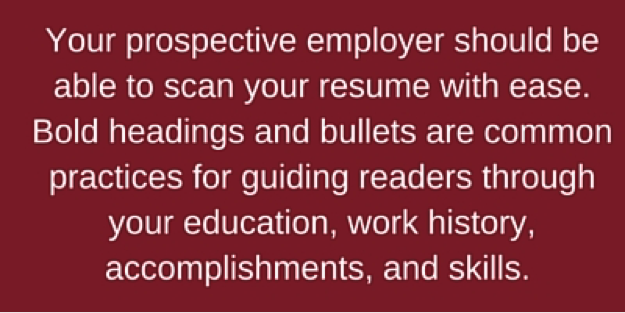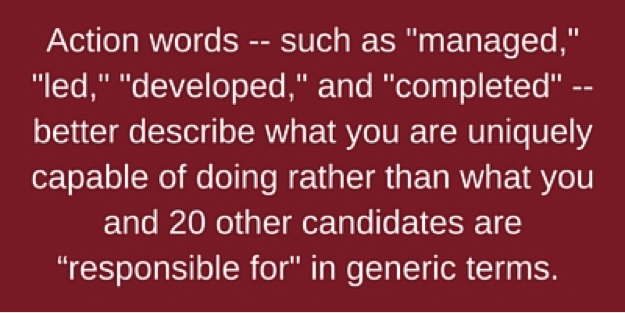Associates
Career Column: 10 Resume Mistakes to Avoid

Resume writing is no different than other Business Writing Essentials. Improving your writing skills can support your career and job search in a multitude of ways.
Become a confident and effective writer.
Almost every professional position requires some form of business writing, and how you write can have a significant impact on how others judge you and your ideas. Writing is a skill, and you can improve your ability to express your ideas clearly and concisely. In this course, you'l learn best practices for business writing and how to use a practical business style to make your writing more effective. You'll also get tips for editing your work and guidelines for composing emails and other electronic communication. Click Business Writing Essentials to see course outline.
Whether you're unemployed, promotion bound, or just seeking something different, job hunting can be a difficult task. So many aspects of the process are outside of your control, such as which positions are available, who is hiring, and the number/quality of other candidates. That's not to mention the frustration of awaiting a call from a potential employer that might never come. However, you can take steps to ensure that the factors inside your control — namely your resume — work for you, instead of against you. Creating or updating your resume isn't everyone's favorite thing to do, but it is a necessary evil in the process of obtaining your next position. Put yourself and your job search on the right track by heeding these 10 resume mistakes to avoid.
1. Not Checking for Typos and Bad Grammar
In an electronic age where spell check is readily available, sloppy mechanics and grammatical errors are unacceptable. Before you send out your resume to a potential employer, give it a final once-over, looking for typos and bad grammar (and even just vague phrasing). Better yet, get someone else with a keen eye to give it a good proofread.
2. Not Organizing the Page
Your prospective employer should be able to scan your resume with ease. Bold headings and bullets are common practices for guiding readers through your education, work history, accomplishments, and skills. Be sure to align bullets for each section and use the same size and style of bullets throughout your resume.

3. Choosing an Off-Putting Font
Font styles that are decorative, too large, or too small are a distraction and can actually hurt readability. Common, easy-to-read font styles such as Arial or Times New Roman at 12-point font are typically sufficient, but if you do choose a less-common font, make sure that it's readable and appropriate for your image.
4. Making your Resume Too Short or Too Long
Resumes that are too short are often vague and short on specifics, which may catch your potential employer's attention in a bad way. Lengthy resumes of more than two pages may be overwhelming to look at, making it difficult for the employer to focus on the most important information. Starting with your most recent and/or relevant experience is helpful in this regard. Once your resume reaches a full page (two pages max), you can begin to shorten or even eliminate sections toward the end that are less relevant for the specific position you are seeking.
5. Not Tailoring Your Resume to the Job Opening
It's always a good idea to study the job description for the position you are applying for, because it's the best way to learn what recruiters are looking for. Use this information to determine which previous positions, experience, and skills to elaborate on and which ones to eliminate on the resume that you present for each individual employer. Never send just a standard resume to every single job listing you apply for. Even if it's just adjusting a few details, you should tailor your resume to match the job description as much as possible.
6. Embellishing or Outright Lying on Your Resume
Complete honesty is always the best practice on your resume. Recruiters may check up on you through references or question you during the interview for specifics about your skills and accomplishments. Even worse, you may get the job, leaving your new employer to find out that you were dishonest when you are unable to perform tasks you claimed to be capable of originally.
7. Excluding Dates and Other Numbers
Unless you're using a functional resume that focuses on major skills rather than a list of employers or schools, neglecting to include dates for past jobs and other activities may lead the employer to be skeptical. Always maintain honesty. A good course of action is to positively address any gaps in employment or concerns about education in your cover letter. When using a functional resume that excludes dates, provide numerical data that the resume reviewer can zoom in on, such as sales figures or the number of customers you served.
8. Not Using Action Words
Action words -- such as "managed," "led," "developed," and "completed" -- better describe what you are uniquely capable of doing rather than what you and 20 other candidates are "responsible for" in generic terms. Incorporating action words will help you to stand out through measurable accomplishments, not day-to-day routines.

9. Not Listing Skills and Training
Catch a recruiter's eye by listing training and skills on your resume that match the job listing. When possible, position each list at the beginning of your resume, where it will stand out right away. Don't forget major volunteer skills, special certifications, and military training.
10. Using Quirky Email and Voicemail
Of all the cardinal sins of resume-creating, this one might seem to be the most obvious. However, many people continue to overlook this simple but pertinent step. Quirky email addresses, such as JOBS4BOB@gomama.net, and voicemail greetings recorded by your children are fun but do not make the best impression on most employers. Use an email address and a voice mail greeting that show professional taste.
Starting a job search can be both challenging and rewarding. If you steer clear of these missteps on your resume, you'll be rewarded with the attention of committed recruiters!
Don't forget you can learn best practices for business writing and how to use a practical business style to make your writing more effective. You'll also get tips for editing your work and guidelines for composing emails and other electronic communication. Click Business Writing Essentials to see course outline.
For more information about our course topics, contact Debi Ford, debi@dunsonandassociates.com or 937-854-5940.



Dunson & Associates, a Global Knowledge Authorized Training Partner, offers more than 3000 IT and Business courses! Click here to enter our learning portal, which allows you to view course outlines, schedule, manage and purchase training
© Copyright 2021 Dunson & Associates

